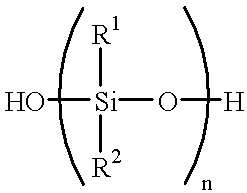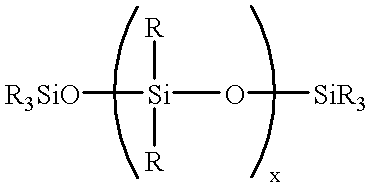Filler/silicone oil masterbatch with treating agent for RTV polysiloxanes
a technology of which is applied in the field of rtv polysiloxanes treating agent and rtv polysiloxanes, can solve the problem of unsuitable manufacturing time and process requirements
- Summary
- Abstract
- Description
- Claims
- Application Information
AI Technical Summary
Benefits of technology
Problems solved by technology
Method used
Image
Examples
example 1
53.4 parts by weight of a 500 cps M stopped silicone oil (SF96-500 by General Electric Company), 5.35 parts by weight of water and 5.66 parts by weight of hexamethyldisilazane (HMDZ) are added to a high shear Drais 10 liter mixer and mixed under nitrogen for 10 minutes. After this mixing, 35.59 parts by weight of a hydrophilic fumed silica filler (Degussa A-130, 130 m.sup.2 / g) are added at a rate the batch can accept at 25 rpm mixer shaft speed.
After the addition of the filler, the batch is heated under reflux to 110.degree. C. When the filler begins to mass with the silicone oil an increase in the amperage of the mixer motor is observed. At 110.degree. C. the reflux is stopped and the batch is placed under full vacuum while heating is continued to 140.degree. C. The batch is then maintained at 140.degree. C. under vacuum for 1 additional hour. At the end of 1 hour, the vacuum is broken and the batch is cooled to 120.degree. C.
A filler / oil masterbatch is then recovered.
example 2
55.86 parts by weight of a 500 cps M stopped silicone oil (SF96-500 by General Electric Company), 0.99 parts by weight of water and 1.97 parts by weight of hexamethyldisilazane (HMDZ) are added to a high shear Drais 10 liter mixer and mixed for 10 minutes under nitrogen. 37.23 parts by weight of a hydrophilic fumed silica filler (Degussa A-130, 130 m .sup.2 / g) are then added at a rate the batch can accept at 25 rpm mixer shaft speed. The batch is then heated to 110.degree. C. at a shaft speed of 125 rpm under full reflux. The batch is then cooled to below 30.degree. C., and purged with nitrogen. After purging, an additional 3.95 parts by weight of HMDZ are added to the batch.
After the second addition of the HMDZ, the batch is heated under reflux to 110.degree. C. When the filler begins to mass with the silicone oil an increase in the amperage of the mixer motor is observed. At 110.degree. C. the reflux is stopped and the batch is placed under full vacuum while heating is continued ...
example 3
55.31 parts by weight of a 500 cps M stopped silicone oil (SF96-500 by General Electric Company) are added to a high shear Drais 10 liter mixer along with 1.95 parts by weight of hexamethyldisilazane (HMDZ) and mixed for 10 minutes under nitrogen. 36.87 parts by weight of a hydrophilic fumed silica filler (Degussa A-130, 130 m.sup.2 / g) are then added at a rate the batch can accept at 25 rpm mixer shaft speed. The batch is heated to 110.degree. C. at a shaft speed of 125 rpm under full reflux. The batch is then cooled to below 30.degree. C., and purged with nitrogen. After purging, an additional 5.86 parts by weight of HMDZ are added to the batch.
After the second addition of the HMDZ, the batch is heated under reflux to 110.degree. C. When the filler begins to mass with the silicone oil an increase in the amperage of the mixer motor is observed. At 110 .degree. C. the reflux is stopped and the batch is placed under full vacuum while heating is continued to 140.degree. C. The batch i...
PUM
| Property | Measurement | Unit |
|---|---|---|
| size | aaaaa | aaaaa |
| size | aaaaa | aaaaa |
| diameter | aaaaa | aaaaa |
Abstract
Description
Claims
Application Information
 Login to View More
Login to View More - R&D
- Intellectual Property
- Life Sciences
- Materials
- Tech Scout
- Unparalleled Data Quality
- Higher Quality Content
- 60% Fewer Hallucinations
Browse by: Latest US Patents, China's latest patents, Technical Efficacy Thesaurus, Application Domain, Technology Topic, Popular Technical Reports.
© 2025 PatSnap. All rights reserved.Legal|Privacy policy|Modern Slavery Act Transparency Statement|Sitemap|About US| Contact US: help@patsnap.com



